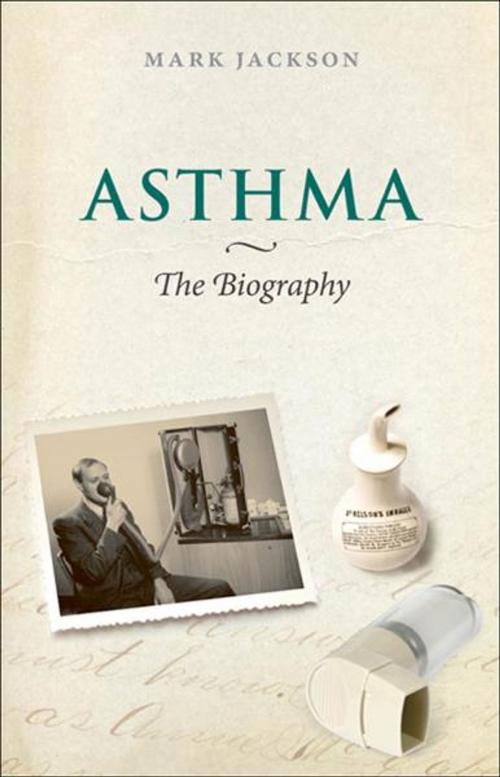Asthma: The Biography
Nonfiction, Health & Well Being, Medical, Reference, History, Science & Nature, Science| Author: | Mark Jackson | ISBN: | 9780191622823 |
| Publisher: | OUP Oxford | Publication: | October 8, 2009 |
| Imprint: | OUP Oxford | Language: | English |
| Author: | Mark Jackson |
| ISBN: | 9780191622823 |
| Publisher: | OUP Oxford |
| Publication: | October 8, 2009 |
| Imprint: | OUP Oxford |
| Language: | English |
Asthma is a familiar and growing disease today, but its story goes back to the ancient world, as we know from accounts in ancient texts from China, India, Greece and Rome. It was treated with acupuncture and Ayurveda. As Western medicine developed, the nature of asthma became clearer, and its basis in the lungs recognized. But cultural perceptions of the disease shifted too. By the 18th century, with recognition that the disease was centred on the lungs, the idea of environmental triggers such as dust and smoke first became recognized. And with that, asthma also became identified as a disease of artisans. Things changed again in the 19th century, as medical understanding grew with the advent of the stethoscope and new techniques such as percussion of the chest. New treatments included the promotion of mountain spas, for asthma now rose in social status, and became associated with the upper classes and the literati. For Marcel Proust and Charles Dickens, asthma shaped their lives and their creativity. From early in the 20th century, the idea of asthma as an allergic disease became established, and the search for environmental causes was on. Hay fever was closely linked, and pharmaceutical companies began to make antihistamines, anti-inflammatories and bronchodilators. Asthma sufferers were warned to beware of pets, simplify their furnishings, and take holidays by the sea far from pollens. But a newly emerging concept was that attacks could be triggered by stress and psychological factors. With musicians such as Schoenberg and Berg as celebrity sufferers, the idea of asthma as an élite disease persisted. In recent years, attitudes have changed again, as incidences of asthma grew dramatically across the world, especially among the young. The disease has now become closely linked to modern lifestyles and the many products of civilization. The battle against house-dust mites began, and whole new lines of anti-allergenic products and foods were launched - asthma has proved highly lucrative over the years. But the disease has remained fashionable, even becoming the theme of several pop songs. Asthma: the biography is part of the Oxford series, Biographies of Diseases, edited by William and Helen Bynum. In each individual volume an expert historian of medicine tells the story of a particular disease or condition throughout history - not only in terms of growing medical understanding of its nature and cure, but also shifting social and cultural attitudes, and changes in the meaning of the name of the disease itself.
Asthma is a familiar and growing disease today, but its story goes back to the ancient world, as we know from accounts in ancient texts from China, India, Greece and Rome. It was treated with acupuncture and Ayurveda. As Western medicine developed, the nature of asthma became clearer, and its basis in the lungs recognized. But cultural perceptions of the disease shifted too. By the 18th century, with recognition that the disease was centred on the lungs, the idea of environmental triggers such as dust and smoke first became recognized. And with that, asthma also became identified as a disease of artisans. Things changed again in the 19th century, as medical understanding grew with the advent of the stethoscope and new techniques such as percussion of the chest. New treatments included the promotion of mountain spas, for asthma now rose in social status, and became associated with the upper classes and the literati. For Marcel Proust and Charles Dickens, asthma shaped their lives and their creativity. From early in the 20th century, the idea of asthma as an allergic disease became established, and the search for environmental causes was on. Hay fever was closely linked, and pharmaceutical companies began to make antihistamines, anti-inflammatories and bronchodilators. Asthma sufferers were warned to beware of pets, simplify their furnishings, and take holidays by the sea far from pollens. But a newly emerging concept was that attacks could be triggered by stress and psychological factors. With musicians such as Schoenberg and Berg as celebrity sufferers, the idea of asthma as an élite disease persisted. In recent years, attitudes have changed again, as incidences of asthma grew dramatically across the world, especially among the young. The disease has now become closely linked to modern lifestyles and the many products of civilization. The battle against house-dust mites began, and whole new lines of anti-allergenic products and foods were launched - asthma has proved highly lucrative over the years. But the disease has remained fashionable, even becoming the theme of several pop songs. Asthma: the biography is part of the Oxford series, Biographies of Diseases, edited by William and Helen Bynum. In each individual volume an expert historian of medicine tells the story of a particular disease or condition throughout history - not only in terms of growing medical understanding of its nature and cure, but also shifting social and cultural attitudes, and changes in the meaning of the name of the disease itself.















